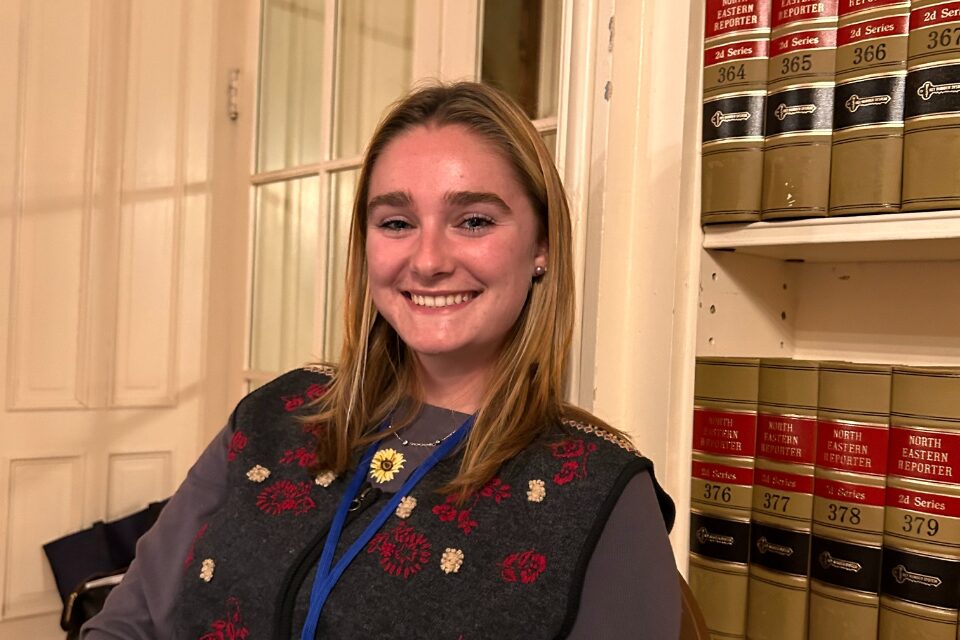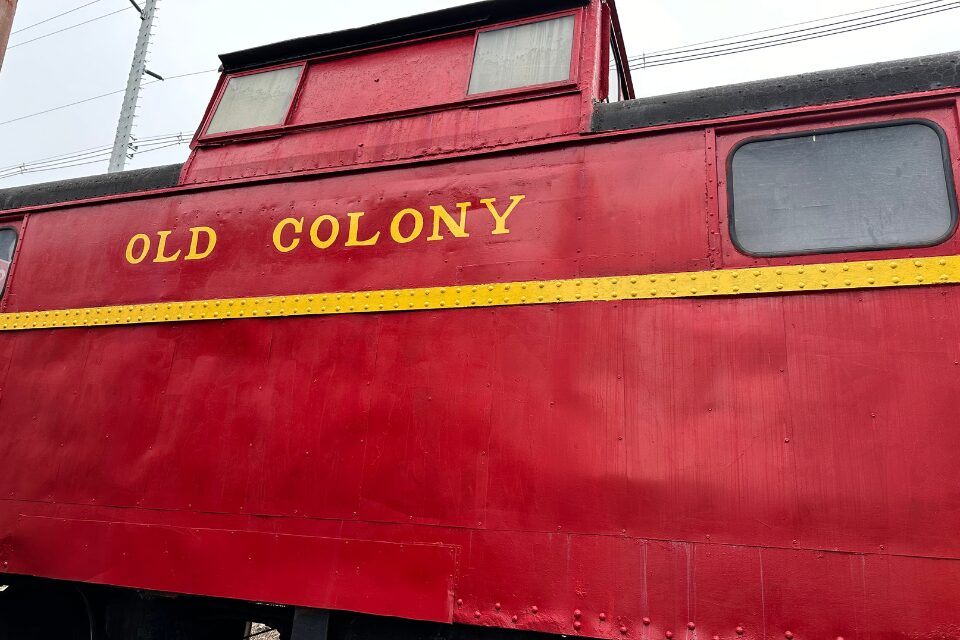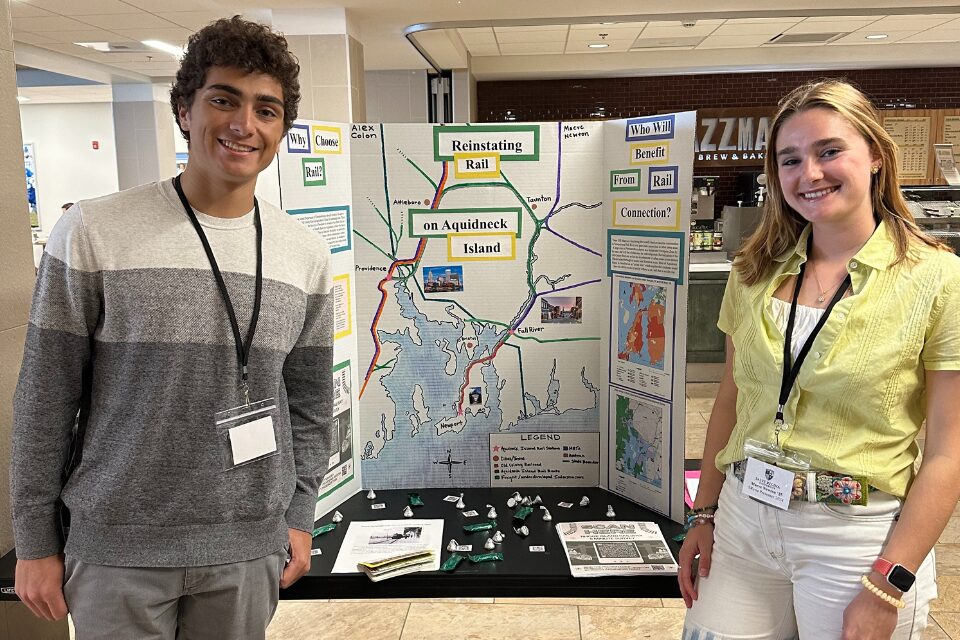All aboard: Senior Maeve Newton to present research on Newport’s transit lines at SRyou Student Exposition

By student writer Faith Lam
Senior Maeve Newton is set to present her research at Salve Regina University’s SRyou Student Exhibition on Wednesday, April 2, exploring the past and future of rail travel on Aquidneck Island. Her project examines the history of the Newport transit lines and proposes the return of passenger rail service connecting Newport, R.I., to Fall River, Massachusetts and beyond.
Inspired by the accessibility of public transportation during her study abroad experience in Ireland, Newton’s work brings together historic preservation, sustainable urban planning and community impact. Read on as she shares her research journey, key insights and hopes for the future of rail travel in Newport.
Q: Tell us about your project.
A: At the SRyou Student Exhibition, I will be presenting my senior thesis, which is on the transportation landscape of Aquidneck Island and bringing passenger rail back to Newport via Fall River. There are train tracks here on Aquidneck Island that have not been used since the ’80s. So, there’s enormous potential for growth of public transportation on Aquidneck Island and it would connect us to Boston, Massachusetts easier.
Q: What inspired you to take on this research?
A: I had studied abroad in Ireland, and their public transportation – while not exactly robust –allowed me to travel anywhere I wanted by bus and train. For example, I could decide one morning to take the bus to a random town, and I could get there. When I got back to Newport, I thought I’d have the same access. But it wasn’t quite as simple. As a college student at Salve, I wanted to explore New England, but it took a fair amount of time and research to figure out how to do that without a car. It made me realize how important public transportation was. So, I started to wonder, “what about people who have jobs in various parts of Aquidneck Island or people who live in Fall River and work in Newport? What did their commutes look like without accessible public transportation?”
Q: Can you discuss the key milestones in the development of your project?
A: Connecting with the Old Colony and Newport Railway was the catalyst to my decision of making this my senior thesis. As a cultural and historic preservation major, I’ve spent the fall semester researching and forming my idea for how historic preservation comes into play with this. My focus has become understanding sustainable urban planning and how historic preservation goes along with transportation. My next big milestone was just recently, when I collected data on my own survey, and it was approved by the University’s Institutional Review Board (IRB). This approval allowed me to share the data and the survey, and now I get to present the results and can even get it published.

Antique caboose from the Old Colony Railway.
Q: Have you faced any challenges throughout this project?
A: One challenge I’m currently facing is making sure that I’m representing the people who responded to my survey in the right way. I need to make sure I’m not adding bias but also keeping my overarching thesis statement top of mind. Historic preservation is a driving factor of this project and remembering that it’s not just a transportation issue or a sustainability issue, but also a historic preservation issue. The rail tracks are a significant part of Aquidneck Island’s historic landscape. People who are interested in rail transportation typically look at it from a very utilitarian view, but I think that there’s a community aspect that could be tapped for a more holistic view of its potential.
Q: What have been your findings so far?
A: I have representation in over 90 age groups and I’m finding that across all of them, more than 50% of people who responded positively to the question I asked: Would you utilize passenger rail between Newport and Fall River to access the greater region of southern New England?
There has been a significant amount of support between all the age groups for their belief that passenger rail would benefit the Newport and Fall River communities.
Q: What are you most excited to share with the University’s community?
A: I’m really excited to share my survey results, especially being someone studying the humanities for four years, and feeling like I have scientific findings. Also, as a senior, being able to leave having provided original research to the field of urban planning and Newport has been super rewarding. I am excited to have contributed to that and share it with the Salve community because I think Salve is a huge stakeholder in this issue as so many students, especially all our first-year students, do not have cars. These students, as well as upperclassmen who might come from other urban areas and aren’t used to driving everywhere, deserve opportunities to explore the region in which they study.
Q: How does this research align with the University’s mercy mission?
A: The critical concern of earth plays a huge role in this project; this is because public transportation has a more sustainable future than private car travel. Racism also plays a part within the growth of this project and its relation to the greater Newport community. When you look at Newport’s landscape we have a very gentrified city. Our campus is located within a highly affluent and relatively inaccessible area, where the properties get larger and the public transportation gets sparser. Looking at environmental justice and income maps tell a lot of that story and how there might be populations of people who can’t afford to own a car, but they could seek economic job opportunity in a place such as Newport.
Q: What are you most proud of accomplishing?
A: I am proud of keeping this project going after a full year. This will be my second time presenting this research at SRyou Student Exposition, and I would not have expected a year ago that this project would grow to the scale that it has. I am proud of the impact that this project could have on the community, later down the line. This change might not happen immediately, but I’m glad I got to be part of this conversation. I have added a significant amount of tangible facts and hard data, which helps in any case, just to say that there are people interested in rail improvements here on Aquidneck Island.

Alexander Colon ’25 and Maeve Newton ’25 (right) presenting their research at the 2024 SRyou Student Exposition.
Q: What advice would you give to prospective students considering presenting at SRyou Student Exhibition in the future?
A: Follow your passions. You do not have to do a project for a class, do it because you want to do it. This project came about because I was genuinely interested in this topic and wanted to learn what I could do to make a difference.

